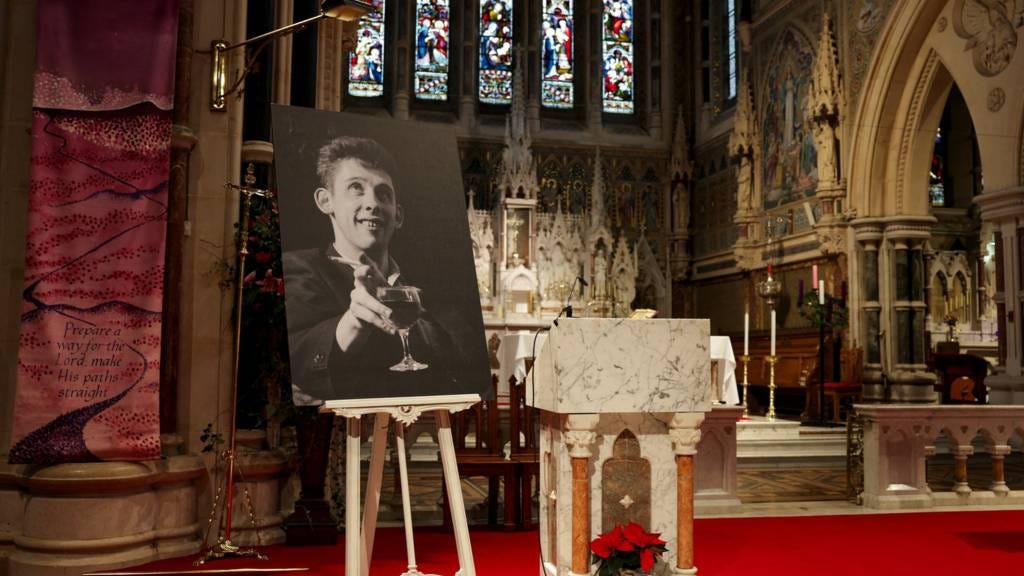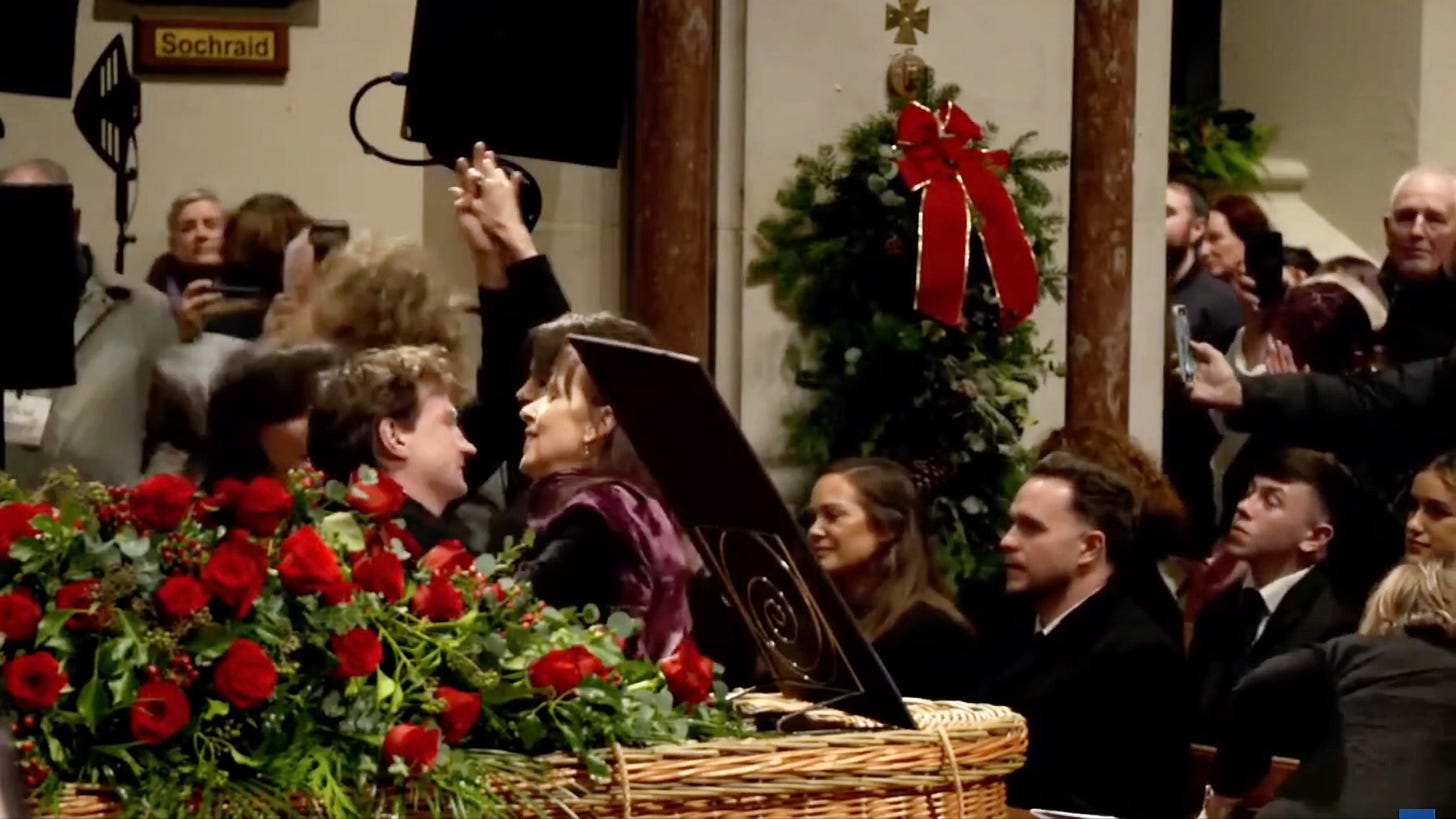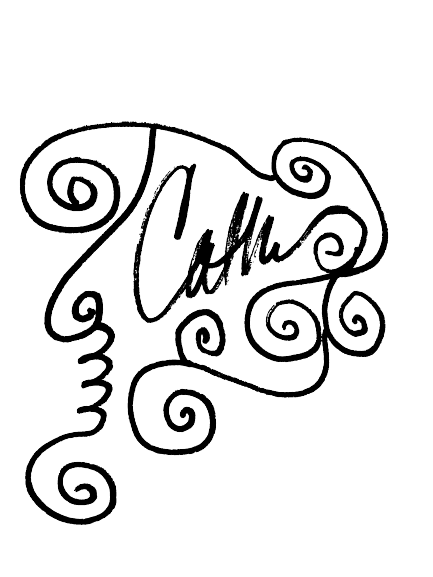Punk & Piety: Shane MacGowan's Parting Glass
At his funeral Friday, Ireland's punk-poet-bard was remembered for his genius, faith, compassion, and love, thru music, spontaneous dancing, colorful eulogies, and one unforgettable homily.

Before Friday, I’d never seen anyone climb over a pew and start dancing in front of a the casket in the middle of a Catholic funeral Mass, but it was Shane MacGowan’s farewell, after all, so the spontaneous revelry felt wholly appropriate.
When most people think of Mr. MacGowan, the late musician, artist, poet, and founder of The Pogues (among many other accomplishments), a man of great faith who had a particular devotion to the Virgin Mary and received daily Communion in the hospital for the last months of his life, is probably not the first image that comes to mind.
He was legendary or infamous (depending on your sensibilities, I suppose) for his raucous (to put it mildly) lifestyle. His often barely intelligible speech. His simultaneously lovable and terrifying hissing laugh. The bloody mosh pit brawls. The chunk missing from his left earlobe. The time he ate a Beach Boys album (it was not Pet Sounds!) while tripping on some psychedelic substance or another.
The teeth.
But as friends and family, literati, glitterati, neighbors, and fans gathered inside Our Lady of the Rosary Roman Catholic Church in Nenagh, Tipperary, with the President of Ireland himself, Michael Higgins, seated in the front pew, over the course of an almost-three-hour funeral Mass (complete with Eucharist and all proper liturgies), a more nuanced, fuller picture of the man emerged.
Former Sinn Fein leader Gerry Adams, a longtime friend of MacGowan, spoke of the gratitude he felt for his friend. “Grateful for his vulnerabilities, his knowledge, and his modesty,” Adams said. “Gratitude for his celebration of the marginalized, the poor, our exiles, and the underdogs. Grateful for The Pogues and for all our music makers, and for all our dreamers of dreams. And thankful for Shane’s prayers.”
Johnny Depp, a close friend of MacGowan who executive produced the mesmeric documentary about his life — Crock of Gold — served as a pall bearer and read one of the collective prayers for the people during the Mass, while the Irish actor Aidan Gillen (Game of Thrones, Kin, Peaky Blinders) read a passage from what was apparently MacGowan’s favourite biblical book: Revelation. The passage described a heavenly River of Life with 12 kinds of fruit trees and leaves “for the healing of the nations.”
The family asked Bono to do the New Testament reading, but he was not able to attend as he was performing last night in Las Vegas with his U2 bandmates. Instead, he made an audio recording of 1 Corinthians 13:11–13 (from Eugene Peterson’s para-translation of the Bible called The Message and with a couple of personal tweaks to the text) that was played during the Mass, just before the Gospel reading and homily. Here’s what it said:
There was music throughout the lengthy Mass, much of it written by MacGowan and performed by his dearest friends including Nick Cave, who sang “A Rainy Night in SoHo;” former Pogues bassist Cáit O'Riordan who sang “I’m A Man You Don’t Meet Every Day” accompanied by the musician John Francis Flynn; and a chorus/seisiún comprised of some of Irelands most celebrated musical artists including members of the Pogues, Imelda May, Liam Ó Maonlaí, and Glen Hansard that performed a roof-raising rendition of MacGowan’s iconic “Fairy Tale of New York.”
It was the latter that inspired MacGowan’s wife, Victoria Clarke, and his sister, Siobhan, to clamber over pews and begin dancing with partners on the chancel in front of the wicker casket that held Shane’s mortal remains.
It was a joyful, unpredictable, unorthodox funeral that matched the soul whose life it was celebrating — a man who so hated funerals (as well as the subject of death in general and his in particular), he rarely attended them.
Father Pat Gilbert, co-priest at the Nenagh parish where MacGowan and his family have long ties, presided at the funeral Mass, where he the mourners follow their hearts — some might say he let the Wild Goose of the Holy Spirit just do its thing — while managing to keep the vibe on the gently untamable side of wild.
Gilbert also delivered one of the most effective, and unusual, funeral homilies I’ve ever heard. It was so moving and unexpected that as I followed the funeral broadcast online, I began transcribing it for my own benefit. But here it is below for yours.
(You also can watch the homily and the funeral in its entirety on YouTube HERE.)
Homily by Fr. Pat Gilbert for Shane MacGowan’s Funeral
“Shane participated in Nick [Cave]’s rendition of the [Bob] Dylan classic, ‘Death Is Not The End.”
“’For the tree of life is growing
How the spirit never dies
And the bright light of salvation
Shines in dark and empty skiesNot the end, not the end
Just remember that death is not the end
Not the end, not the end
Just remember that death is not the end’
“I grew up listening to the music of [Thin] Lizzy, the Horslips, The Rats, The Undertones, and The Pogues.
“As teenagers, the music and the lyric alerted us to what was happening around us. There was also the pride of being Irish, what they could say and sing and share was right and reasoned, as far as we were concerned.
“In fact, Shane and The Pogues made it international and cool to play the tin whistle, the banjo, or the accordion. And for a young fellow who was after struggling to learn the button accordion, that was salvation.
“As teenagers, not being able to verbalize our uneasiness, displeasure, our uncomfortable assessment of what was happening all around us, we found an outlet, a channel, a conduit in the music and lyric of the day.
“In the words of Dickens: It was the best of times, and it was the worst of times. But the music and the lyric were tremendous, and Shane was the master of them all.
“As Brendan Behan did in prose, Shane MacGowan did in poetry. The raw, vibrant, energetic, earthy, soul-filled expression gave us hope and heart and hankering.
“What Seán Ó Riada had expressed in the life of liturgy, Shane MacGowan expressed in the raw life of living.
“He connected the cultural, the sociological, the spiritual, the physical, the metaphysical into a coherent translation of what was happening all around us.
“Shane also contributed to a rendition of ‘The Little Drummer Boy’ performed by the Catholic Priests trio, who said of Shane that he came across as a deeper, richer person who had a depth and sincerity that wasn’t often picked up on by people.
“Our modern-day bard, a social commentator, the songsmith, the son, the brother, the husband, and friend.
“I know he adored you, Victoria, and you him. And you were so loving and supportive and king throughout your lives together. You carried, and cared, and caressed him right to the very end. And I’m also aware of the strong bonds of affection that will knit you together as a family — Maurice, Siobhan, Anthony.
“I know you will miss him terribly. A voice and a presence around you and with you, is suddenly silent. And coping with that loss is always difficult, but in that grief, you are supported by the friendship and concerns of other people, and you are supported, too, by what our Christian faith tells us about death and what it means.
“For Shane had great faith in Our Blessed Lady and received Holy Communion from this church regularly. A man who often knelt before a fellow human being on the side of the road and offered kindness, assistance, and care.
“Born on the birthday of Jesus and passing the same days as Oscar Wilde and Patrick Kavanagh, and his funeral celebration Mass today on this great feast day of Mary — and of course, it’s also Sinéad’s birthday — something seems right about all of this.
“In one of his best-loved songs, “The Sickbed of Cuchulainn,” he interrupts his own funeral, snarling:
“’And they'll take you up to Cloughprior and shove you in the ground
And you'll stick your head back out and shout "We'll have another round!”’
“But mortality was always at the heart of his music. A poet, lyricist, singer, trailblazer, he reflects life as lived in our time, calling out accepted norms that oftentimes appear unacceptable.
“But in order to speak, he had to be heard, and you have to have that revolutionary edge to life. And if you have to have it, the first step is to listen.
“And Shane was a great listener, obviously.
“Mary’s character in the Gospel story listens and she’s deemed to have chosen the better part. In listening, she recognizes the revolutionary Jesus who would eventually take mortality on so life could have another round.
“There Lazarus would feature in the prequel of his own resurrection. [Jesus] listened to the plight of the sisters’ grief. His listening morphed into something life giving.
“The poet, the lyricist, singer, trailblazer gave successive generations the benefit of his listening to the disquiet of life.
“Shane spoke and sang from the listened depths of his own journey, and so did, as poets, lyricists, and trailblazers do, he spoke to life’s realities to t he many who had been numbered as his fans. Life-giving words.
“As for Martha, she responds to Jesus with those life-giving words, “Yes, Lord, I believe you are the Messiah.”
“’For the tree of life is growing
How the spirit never dies
And the bright light of salvation
Shines in dark and empty skies
Not the end, not the end
Just remember, death is not the end’
“Your life gave growth to so many of us, Shane, and your bright light gave salvation to our often dark and empty skies.
“May the Lord of earth and sky welcome you into eternal light and salvation. As you knelt before altar and the person in need, may you now stand before your God who loved you in life and now welcomes you in death.
‘Not the end, not the end
Just remember that death is not the end’
“Rest in peace, Shane. Rest in peace.”
There were several eulogies, each moving, joyful, and humorous, none moreso than the one delivered by Clarke, who spoke at length about her husband’s profound and eclectic faith.
“Shane, he didn’t just like to go to the dark places and the weird places, he also liked to go to the more blissful, transcendent, and spiritual places,” Clarke said. “He could go there with music and he quite often he could go there by listening to music….Music could take us to places that were so heavenly that it was like God. Music was like God, to Shane…it was his way of communicating God.”
Her husband was “intensely religious,” Clarke said. “. I’ve met a lot of priests in my time, but I have yet to meet one that genuinely believes that he is imbued with Christ when he takes communion. But Shane got an actual, physical, visceral buzz off out of the Holy Communion, which was almost as good as a drug for him. He absolutely loved it.” She went on to tell a story that, along with forthright mentions of the pharmacopoeia reference book he used to travel with to identify the effects of various drugs and the 100 tabs of acid he took in a single day, surely is unique in the history of funeral rites.
MacGowan spent much of the last year of his life in the hospital being treated for a viral infection that affected his brain and various other maladies, some the result of a lifetime of abusing his physical body with alcohol, other mind-altering substances, and “every drug known to man.” While hospitalized, he couldn’t attend Mass in person, so the consecrated host was brought to him, presumably by a priest. One day, a different priest visited MacGowan’s room, noticed a little receptacle that held communion wafers, and asked about it.
“He takes Holy Communion every day,” Clarke said. The visiting priest was apoplectic. How could that be? Where did he get the consecrated hosts?
“Well, I’m not gonna reveal his sources,” Clarke said, to which, she said, the flustered priest responded, “That’s illegal!” and promptly “confiscated” the wafers.
“He must be the only man in the world who’s been busted for Holy Communion,” she said to a roar of laugher and applause from the congregation.
“Shane prayed every single day. He was very grateful to be alive he was grateful for the gift of life. Every day that he woke up, he gave thanks and prayed to God for giving him another day and he also prayed for people — all kinds of people — all the time every day all day,” Clarke said.

Her husband, a voracious reader with endless curiosity about the world, immersed himself in learning about various spiritual traditions beyond his native Christianity. He studied Taosim and Buddhism and various Eastern religious. He read, and loved, according to Clarke, the Quran. “I suppose he distilled the essence of that into love. He just loved humanity and he believed that God is love and ultimately God is compassion and God is forgiveness.”
“When I first met him, he was a little slow to forgive the Brits, but he kinda came round to it and he started to really really really forgive everybody everything immediately,” she continued, turning her attention to Depp, who was seated in a pew toward the front. “I hope you don’t mind me saying this, Johnny, but when Johnny had the court case involving his ex-wife Amber, Shane had a long conversation with you, didn’t he, and urged you forgive Amber. Yeah. He just thought it was the best thing to do because he genuinely believed in forgiveness…
“He wouldn’t hold a grudge against anyone. He just wouldn’t see the bad in anyone, and particularly toward the end. … He could be cantankerous and rude and sometimes downright hostile … But toward the end, he just told everyone how much he loved them,” she said. “I don’t think love can go away, can it?”
MacGowan kept a statue of the Virgin Mary on his hospital table and always wore a crucifix often accompanied by a tangle of scapulars and various other religious medals. “I think he was trying to convey to people that there is something in this stuff, there is something in Jesus that’s valuable and worth exploring … that Jesus is a real force and love is real. … Love is everything,” Clarke said.
“He could never pass a homeless person without stopping and pulling out a wad of cash and giving them a cigarette or whatever it is they wanted. And he would never in any way judge them or patronize them. If they wanted a drink he gave them a drink. He totally respected their freedom of choice and I think that’s a very beautiful thing because we’re very quick to judge people in our society who are marginalized and live on the street and think it somehow must be their own fault….
“He demonstrated that it was possible to be a multiple drug abuser …. there wasn’t a single drug he didn’t take — and to still be a genius and a beautiful soul and make a massive contribution to the world and be loved. So, the next time you [see] somebody who you are thinking, ‘That guy is just an alcoholic or a drug addict,’ stop. Give thought to it and just let yourself consider giving a bit of compassion and respect to that person. That would be my final message.”
After the eulogies, members of the Pogues, with tin whistler Spider Stacy singing lead vocals, were joined by Hansard and many other musicians on hand, in an emotional rendition of “The Parting Glass” that was greeted by a standing ovation.
Gilbert then returned to the pulpit saying, “Thank you, gentlemen. I think I’ve died and gone to heaven: The Pogues.”
Before the final commendation drew the funeral Mass to a close, Gilbert thanked the a half-dozen fellow priests who co-officiated the funeral and the thousands of mourners who had lined the streets of south Dublin as MacGowan’s cortege, lead by a horse-drawn glass hearse carrying his wicker casket and later filled the Tipperary church to standing-room-only capacity and packed the street outside during the lengthy Mass, for their “patience, reverence, and prayerfulness.”
“We have something very special in this country,” Gilbert said. “We have love, faith, family and friends. May we always have it.”
Rest well, Shane.
Ar dheis Dé go raibh a anam.
RELATED:
KEENING: Songs to See Us Through
Special Holiday Sale: 50% Off Annual Subscriptions
Think of it as a BOGO. Buy one for yourself, give a gift subscription to someone you love — two for the price of one. Or four for the price of two. Or 20 for the price of 10.
Now through January 2, 2024.
Please be brave and kind. With others. With yourself.
And remember: You haven’t met yet everyone you will love, and you haven’t met yet everyone who will love you.
Much love from me,






Oh, wow, just reading about the funeral has me weepy and joyous. What an incredible life. What incredible music he made.
I didn’t get the chance to watch the livestream due to work deadlines, but I’ve read accounts and obituaries and reflections in recent days and your write up was a beautiful way to sit and muse in quiet before listening to the ruckus sun and wonder of Rum, Sodomy and The Lash for the first time in years.
Thank you,
B 🏴